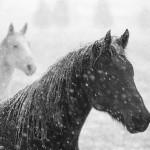Follow these top tips on looking after your horse in the cold for a worry-free winter.
As we all know, British weather can be turbulent at the best of times. Winter can be beautiful sunshine one minute and treacherous snow the next. From the looks of the recent weather reports, it looks like the weather is going to be white all over the UK leading up to and after Christmas so, how are you going to look after your horse in these blustery, snowy conditions?
Now, although horses have a natural hardiness to their coats and bodies due to the long years experiencing all weathers, horse owners should also supplement with other things.
Thoroughbreds and Arabs, are well able to cope with our hot summers as a result of being from hot countries, but are not equipped for British Winters. They do not use their nutritional energy as efficiently, do not tend to store so much fat and do not grow such a thick winter coat. Owners of warm blooded horses like to stable their equines overnight to shelter them from the weather. Even in a stable, most of the finer breeds will need a rug and plenty of food. There is no reason, however, why even a pure bred Arab or Thoroughbred cannot live out all year round with appropriate care. By providing a field shelter, a good quality winter rug and a well thought out diet, the balance between energy intake and energy output should be manageable throughout the colder months.
FEED
First of all, look at what you are feeding your horse. Like us humans, horses need more food in the winter as it can be stored as fat to insulate their bodies. The grass that your horse has consumed over the summer and the warmer part of autumn will help to keep your horse nicely rounded but as soon as the frost hits and snow falls, the grass will no longer be available and the weight they have gained. To help this start offering hay or haylage to horses at grass to minimise the change to the diet once grass growth slows. This is important in all horses but particularly in pregnant mares and young stock. For horses in work, the heavy conditions underfoot mean they have to work harder. Combined with a drop in grazing quality, this means that they require more feed and forage to keep weight on. The mild, warm autumn has also led to an increase in the activity of stored pests, such as mite, which thrive in these environments. Good feed hygiene and clearing up all spillages will help guard against unwanted creepy crawlies. For horses out wintering at grass and in good condition, use a vitamin and mineral supplement to maintain essential micronutrient supplies.
RUGS
Different breed requirements, age, health and living environment go some way towards explaining why some horses are rugged and some not. Some working horses will be clipped in winter to prevent them becoming uncomfortable when being ridden or driven which means they will need a rug to compensate. A horse that is adapted well to cold temperatures may become uncomfortably hot if rugged unnecessarily and horses in general actually find it harder than humans to cool down once they have overheated, because their bodies are so efficient at keeping the heat in.
Because horses can sweat so much when wearing a rug, they should be removed once a day to check underneath as the nice, warm, damp area can lead to skin problems. Also, natural hair loss can accumulate under a rug which can be itchy and unpleasant for your horse.
By removing the rug, you can check underneath it on both the body and the underside of the rug. This can also help in checking if your horse has lost any weight.
WATER
With regards to water, most people tend to think horses need more in the summer however, in contrast to us humans; they need more in the winter. This is because when horses eat the grass in the winter, it consists of 80% water whereas in the winter, as a result of the horses eating hay and haylage, this dehydrates them more and so need water. However, with the freezing temperatures, the water is likely to freeze over in the winter so to ensure this doesnāt happen, from first thing in the morning, regularly check your horseās water.
SHELTER
With the cold winter fast approaching, shelter is important to protectĀ horses from the harsh conditions. Mobile field shelters (see https://www.primestables.co.uk/our-range/mobile-field-shelters/)Ā are particularly useful as they can be towed (seeĀ http://www.youtube.com/watch?v=8yAonx56q4A), you donāt need planning permission for them and they provide shelter for your horse without the need of a concrete base.Ā Shelter is also useful in the summer for providing shade for your horses to keep them out of the sun.
SUMMARY
- Mud can be unavoidable during the winter. Unless the mud is causing or looking like a veterinary condition, the owner is within the law.
- Horses will often deliberately roll in mud to help create an extra layer to protect them from the elements.
- Ā Most native ponies would become obese if they were to have access to unlimited quantities of food, even in very cold weather. An equine needs the right amount of food to keep it in good bodily condition. Look at the body of your horse or pony to check if it is in good condition: if so, it means that they areĀ getting enough food.
- So, in conclusion, keep your horses happy this winter with plenty of shelter, nutrition and appropriate horse style clothing!
The Stable Doctor
https://primestables.co.uk/news
Advice is given without legal responsibility
Research: Horse and Hound, Redwings Horse Sanctuary


